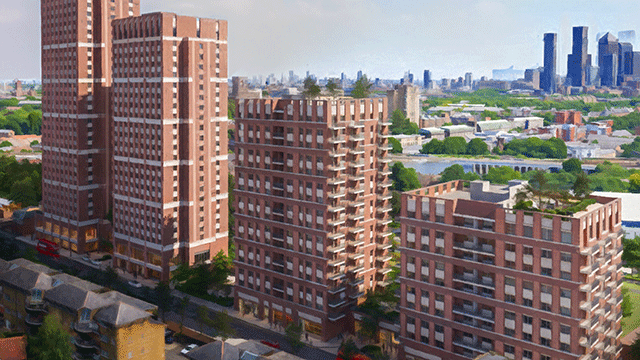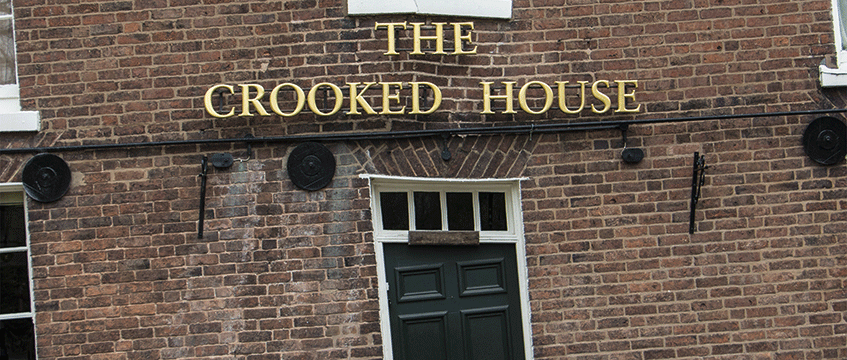A well-known and much-loved community pub closed and sold off to a developer; a request to Historic England to list the building; a devastating fire with the ruins demolished days later; and the West Midlands metro mayor stepping in to plead for the pub’s restoration… the tale of the Crooked House has all the makings of a fly-on-the wall documentary. But beyond the tabloid headlines, what are the planning implications?
A heady cocktail
In English law, the statutory position regarding demolition is complex. While in many circumstances express planning permission is not required for demolition, landowners must check the position carefully. Possible planning and building control breaches are still being investigated following the demolition of the Crooked House, but should its owners be concerned? And what remedies are available to South Staffordshire Council?
The starting point is that, subject to certain limited exceptions, demolition is a building operation pursuant to section 55(1) of the Town and Country Planning Act 1990, for which planning permission is required. Although there are generous permitted development rights in the Town and Country Planning (General Permitted Development) Order 2015, which means that many demolition projects will not require express planning permission, as those familiar with the planning system will be aware, permitted development rights are subject to a myriad of conditions and exemptions.
In order to rely on permitted development rights, in most cases the landowner will need to seek the prior approval of the local planning authority for the proposed method of demolition and any site restoration. Alternatively, where demolition is needed urgently for health and safety reasons, written justification must be provided to the local planning authority as soon as reasonably practicable following the demolition.
If the proposed demolition falls within one of the exemptions, the permitted development rights will not apply, and express planning permission will be required. While not an exclusive list, it is noteworthy that permitted development rights will not apply where the building has been made unsafe or uninhabitable through deliberate action or neglect by the owners, and the building can be made secure through temporary repair or support; or the building was last used as a pub.
Last orders
In the event that demolition takes place without adhering to the prior approval process, or where express planning permission was required but not obtained, the demolition will be unauthorised and may be subject to enforcement action – a decision which is always at the discretion of the individual local planning authority. It must be expedient having regard to the provisions of the development plan and any other material considerations (section 172 of the 1990 Act).
There is precedent for a local planning authority requiring a landowner to rebuild a pub which had been demolished unlawfully: in 2015, the Carlton Tavern – a popular Maida Vale pub opened in the 1920s – was demolished without the landowner seeking the requisite planning permission. Westminster City Council issued an enforcement notice requiring the pub to be rebuilt. The landowner appealed, and the inspector upheld the council’s enforcement notice, concluding that there was no reason that a detailed and accurate reconstruction of the building could not be undertaken.
The pub reopened in 2021 and, despite the lingering impacts of Covid-19 and the cost-of-living crisis, appeared to be doing well. However, in May 2023, a planning application was made to turn the upper two floors of the building into individual apartments on the basis that the space is no longer required for the operation of the pub. Is this a pragmatic approach to support the ongoing viability of the pub while at the same time providing much-needed housing, or is it the thin end of the wedge?
Where a building is listed, there are wider tools available to the local planning authority, as it is a criminal offence to demolish a listed building without the necessary consents. For example, prosecution powers were used successfully alongside a planning enforcement notice by Ribble Valley Borough Council at the Punch Bowl Inn, a listed Lancashire pub which was demolished without consent in 2021.
While the landowner has been required to rebuild the pub, steps were not immediately taken to reinstate the property, and in May 2023 an application was made to redevelop the site for an alternative use. The council considered that this would be a retrospective application in respect of a breach contained in a pre-existing enforcement notice and declined to determine the application, in reliance on section 70C of the 1990 Act.
The landowner has since applied to discharge a condition of the original enforcement notice requiring a site survey to be undertaken prior to restoration works commencing. Does that signal that the landowner has accepted its fate, or will there be a last throw of the dice? Either way, it will be some time before the Punch Bowl Inn is serving its next pint.
Closing time
With all this in mind, what does the future hold for the Crooked House? It has been widely reported that South Staffordshire Council is investigating potential breaches of planning legislation.
Use of enforcement powers would send a strong message to landowners in the area and beyond. However, local authorities do not have deep pockets, and the end will need to justify the means. Does the council have the appetite to enter a potentially lengthy and costly battle with the landowner which may ultimately represent a pyrrhic victory? Only time will tell.
Stephanie Hall is a partner at Davitt Jones Bould









